Grades1
In this store, you will find quality and detailed Testbanks, worked assignments, quizzes and exams that will take your grades a notch higher.
- 234
- 0
- 0
Community
- Followers
- Following
1 Reviews received
234 items
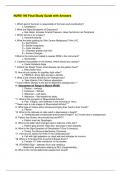
NURS 190 Final Study Guide with Answers
NURS 190 Final Study Guide with Answers NURS 190 Final Study Guide with Answers 1. Which part of the brain is responsible of the brain and coordination? a. Cerebellum. 2. What are Signs/Symptoms of Glaucoma? a. See Halos. Increase Cranial Pressure. Have Central but not Peripheral. 3. Which hernia is for surgery? a. Ventral/Incisional. 4. What the letter grading for Skin Cancer Malignancy? Hint: A-E. A = Asymmetric. B = Border Irregularity. C = Color Variation. D = Diameter greater than 6ml....
- Exam (elaborations)
- • 5 pages •
NURS 190 Final Study Guide with Answers NURS 190 Final Study Guide with Answers 1. Which part of the brain is responsible of the brain and coordination? a. Cerebellum. 2. What are Signs/Symptoms of Glaucoma? a. See Halos. Increase Cranial Pressure. Have Central but not Peripheral. 3. Which hernia is for surgery? a. Ventral/Incisional. 4. What the letter grading for Skin Cancer Malignancy? Hint: A-E. A = Asymmetric. B = Border Irregularity. C = Color Variation. D = Diameter greater than 6ml....
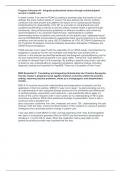
NR603 Week 8 Reflection
NR603 Week 8 Reflection Program Outcome #4: Integrate professional values through scholarship and service in health care In week number 3 we met the PO#4 by creating a treatment plan that would not only address the acute medical needs of “Lorene” but also address the chronic medical conditions that were present and additive risk factors to her cardiovascular disease. Understanding the responsibility of the NP as a provider to comprehend how each symptom/result/finding is relevant to and ha...
- Exam (elaborations)
- • 3 pages •
NR603 Week 8 Reflection Program Outcome #4: Integrate professional values through scholarship and service in health care In week number 3 we met the PO#4 by creating a treatment plan that would not only address the acute medical needs of “Lorene” but also address the chronic medical conditions that were present and additive risk factors to her cardiovascular disease. Understanding the responsibility of the NP as a provider to comprehend how each symptom/result/finding is relevant to and ha...
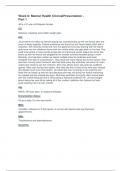
NR603 Week 6 Mental Health Clinical Presentation - Part 1
NR603 Week 6 Mental Health Clinical Presentation - Part 1 Week 6: Mental Health Clinical Presentation Part 1 JA is a 31 year old Hispanic female CC: Sadness, hopeless and sudden weight gain HPI: JA arrived to the office by herself stating she recently broke up with her fiancé after five years of being together. Patient mentioned she found out her fiancé had an affair with a coworker. She recently moved out from the apartment she was leaving with her fiancé and move into her childhood home w...
- Exam (elaborations)
- • 4 pages •
NR603 Week 6 Mental Health Clinical Presentation - Part 1 Week 6: Mental Health Clinical Presentation Part 1 JA is a 31 year old Hispanic female CC: Sadness, hopeless and sudden weight gain HPI: JA arrived to the office by herself stating she recently broke up with her fiancé after five years of being together. Patient mentioned she found out her fiancé had an affair with a coworker. She recently moved out from the apartment she was leaving with her fiancé and move into her childhood home w...
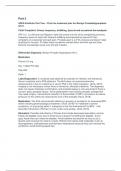
NR603 Week 5 Part 2 APEA Predictor.
NR603 Week 5 Part 2 APEPart 2 APEA Predictor Part Two – First line treatment plan for Benign Prostate Hyperplasia (40.1) Chief Complaint: Urinary frequency, dribbling, dysuria and occasional low back pain HPI: A.C. is a 69-year-old Hispanic male that comes into the clinic complaining of urinary frequency worse at night with frequent dribbling accompanied by dysuria. Pt also complains of occasional low back pain. Pt states pain is a 6/10 at worse and doesn’t take anything for the pain. Pt s...
- Exam (elaborations)
- • 3 pages •
NR603 Week 5 Part 2 APEPart 2 APEA Predictor Part Two – First line treatment plan for Benign Prostate Hyperplasia (40.1) Chief Complaint: Urinary frequency, dribbling, dysuria and occasional low back pain HPI: A.C. is a 69-year-old Hispanic male that comes into the clinic complaining of urinary frequency worse at night with frequent dribbling accompanied by dysuria. Pt also complains of occasional low back pain. Pt states pain is a 6/10 at worse and doesn’t take anything for the pain. Pt s...
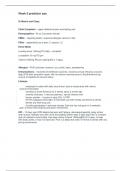
NR603 Week 5 Part 1 Predictor
NR603 Week 5 Part 1 Predictor Week 5 predictor ass Dr Martin and Class, Chief Complaint – upper abdominal pain and feeling sick Demographics - 40 yo Caucasian female PMHx – Hypothyroidism, seasonal allergies (worse in fall) PSHx – appendicitis as a teen, C-section x 2, Home Meds Levothyroxine 100mcg PO daily - compliant Loratadine 10 mg PO prn Tylenol 1000mg PO prn (taking BID x 7 days) Allergies - PCN (unknown reaction, as a child), bees, strawberries Immunizations – received all ch...
- Exam (elaborations)
- • 8 pages •
NR603 Week 5 Part 1 Predictor Week 5 predictor ass Dr Martin and Class, Chief Complaint – upper abdominal pain and feeling sick Demographics - 40 yo Caucasian female PMHx – Hypothyroidism, seasonal allergies (worse in fall) PSHx – appendicitis as a teen, C-section x 2, Home Meds Levothyroxine 100mcg PO daily - compliant Loratadine 10 mg PO prn Tylenol 1000mg PO prn (taking BID x 7 days) Allergies - PCN (unknown reaction, as a child), bees, strawberries Immunizations – received all ch...
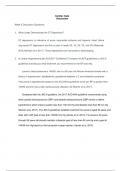
NR603 Week 3 Case Discussion Cardiovascular
NR603 Week 3 Case Discussion Cardiovascular Cardiac Case Discussion Week 3 Discussion Questions: 1. What Leads Demonstrate the ST Depression? ST depression is indicative of acute myocardial ischema and hypoxia. Heart failure may cause ST depression and this is seen in leads V2, V3, V4, V5, and V6 (Klabunde, 2016; Harhash et al 2017). These depressions are horizontal or downsloping. 2. Is Lorene Hypertensive per ACA 2017 Guidelines? Compare the ACA guidelines to JNC 8 guidelines and discuss w...
- Exam (elaborations)
- • 8 pages •
NR603 Week 3 Case Discussion Cardiovascular Cardiac Case Discussion Week 3 Discussion Questions: 1. What Leads Demonstrate the ST Depression? ST depression is indicative of acute myocardial ischema and hypoxia. Heart failure may cause ST depression and this is seen in leads V2, V3, V4, V5, and V6 (Klabunde, 2016; Harhash et al 2017). These depressions are horizontal or downsloping. 2. Is Lorene Hypertensive per ACA 2017 Guidelines? Compare the ACA guidelines to JNC 8 guidelines and discuss w...
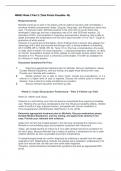
NR603 Week 2 Part 2
NR603 Week 2 Part 2 NR603 Week 2 Part 2 (Total Points Possible: 40) Requirements: Michelle continues to work in the bakery and her asthma has been well controlled on a low-dose inhaled corticosteroid inhaler, Singular 10mg daily, and Albuterol prn which she uses 1-2 times per week. Michelle presents to the clinic with an acute illness that developed 2 days ago and has a respiratory rate of 24, mild SOB with exertion, O2 saturation of 94%, and complaint of inspiratory and expiratory wheezing. S...
- Exam (elaborations)
- • 3 pages •
NR603 Week 2 Part 2 NR603 Week 2 Part 2 (Total Points Possible: 40) Requirements: Michelle continues to work in the bakery and her asthma has been well controlled on a low-dose inhaled corticosteroid inhaler, Singular 10mg daily, and Albuterol prn which she uses 1-2 times per week. Michelle presents to the clinic with an acute illness that developed 2 days ago and has a respiratory rate of 24, mild SOB with exertion, O2 saturation of 94%, and complaint of inspiratory and expiratory wheezing. S...
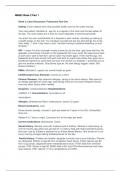
NR603 Week 2
NR603 Week 2 NR603 Week 2 Part 1 Week 2: Case Discussion: Pulmonary Part One Setting: A free medical clinic that provides health care for the under-insured. Your next patient, Michelle G., age 40, is a regular of the clinic and the last patient of the day. The chart states she is here for recent episodes of shortness of breath. You enter the room and Michelle G is dressed in work clothes, standing up looking at a health poster on the wall. You introduce yourself and ask her what brings her t...
- Exam (elaborations)
- • 5 pages •
NR603 Week 2 NR603 Week 2 Part 1 Week 2: Case Discussion: Pulmonary Part One Setting: A free medical clinic that provides health care for the under-insured. Your next patient, Michelle G., age 40, is a regular of the clinic and the last patient of the day. The chart states she is here for recent episodes of shortness of breath. You enter the room and Michelle G is dressed in work clothes, standing up looking at a health poster on the wall. You introduce yourself and ask her what brings her t...
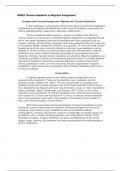
NR603 Tension Headache vs Migraine Assignment
NR603 Tension Headache vs Migraine Assignment NR603 Tension Headache vs Migraine Assignment Compare and Contrast Assignment: Migraine and Tension Headaches In this submission, I will compare and contrast migraine and tension headaches highlighting the similarities and differences in their onset of symptoms, associated risk factors, pathophysiology, assessment, diagnosis, and treatment. The term headache widely refers to a variety of conditions that affect the nervous system and cause pain i...
- Exam (elaborations)
- • 4 pages •
NR603 Tension Headache vs Migraine Assignment NR603 Tension Headache vs Migraine Assignment Compare and Contrast Assignment: Migraine and Tension Headaches In this submission, I will compare and contrast migraine and tension headaches highlighting the similarities and differences in their onset of symptoms, associated risk factors, pathophysiology, assessment, diagnosis, and treatment. The term headache widely refers to a variety of conditions that affect the nervous system and cause pain i...

NR603 Delirium vs Dementia Assignment
NR603 Delirium vs Dementia Assignment NR603 Delirium vs Dementia Assignment Hello Professor and Classmates, Delirium and Dementia Delirium is consider an acute disorder of attention, patients with this disorder will have the inability or disruption, which causes mental confusion making it difficult to think, remember, sleep and pay attention. This is seen relatively commonly in elderly people (Kukreja, Günther, & Popp, 2015). Delirium is a syndrome manifesting as an acute change in mental sta...
- Exam (elaborations)
- • 4 pages •
NR603 Delirium vs Dementia Assignment NR603 Delirium vs Dementia Assignment Hello Professor and Classmates, Delirium and Dementia Delirium is consider an acute disorder of attention, patients with this disorder will have the inability or disruption, which causes mental confusion making it difficult to think, remember, sleep and pay attention. This is seen relatively commonly in elderly people (Kukreja, Günther, & Popp, 2015). Delirium is a syndrome manifesting as an acute change in mental sta...

Testbank for Biology 2nd Edition from OpenStax College ISBN 9781947172517.